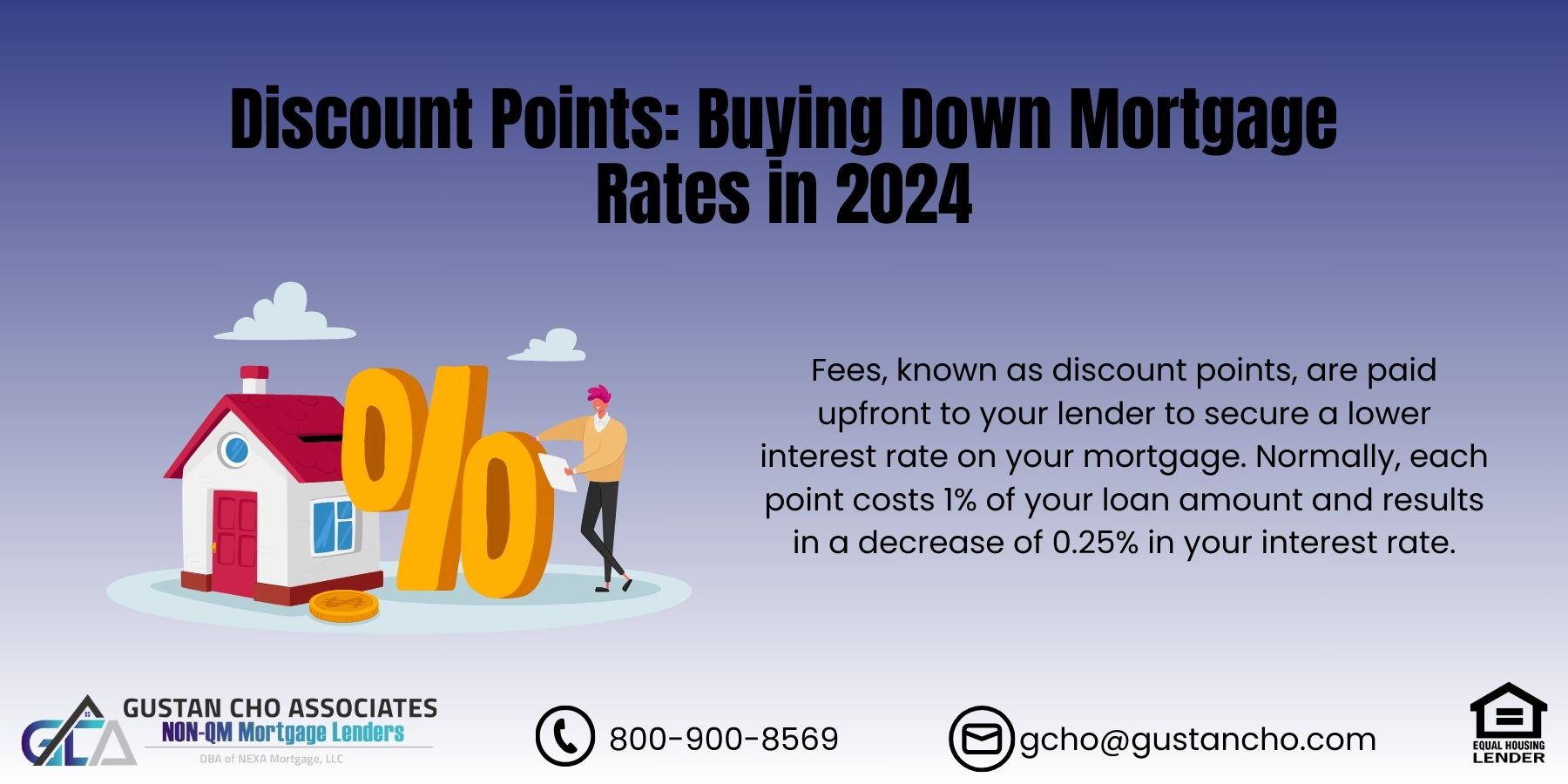Discount Points: Buying Down Mortgage Rates in 2024
Discount Points: How to Buy Down Your Mortgage Rate in 2024
Buying a home is one of the biggest financial decisions most of us will make. While locking in a good mortgage rate is a priority for most homebuyers, not everyone knows that you can lower your interest rate even more by using discount points.
So, what exactly are discount points, and how can they help you save on your mortgage in the long run? This guide will explain everything you need to know about discount points, including how they work, when to use them, and whether they’re a smart choice for your situation in 2024.
What Are Discount Points?
Discount points, sometimes called mortgage points, are fees you pay your lender upfront for a lower interest rate. Each point typically costs 1% of your total loan amount and can reduce your mortgage rate by 0.25%. For example, if you’re taking out a $200,000 mortgage, one discount point would cost $2,000.
The main benefit of paying for discount points is lowering your monthly mortgage payments, saving you thousands of dollars over the life of the loan.
But this option is best for homebuyers who plan to stay in their homes for a longer period. The longer you stay, the more you save at a lower rate. But if you plan to sell or refinance in the next few years, buying down your mortgage rate might not be worth the upfront cost. Speak With Our Loan Officer for Mortgage Loans
How Do Discount Points Work?
Let’s break it down with a simple example:
- Loan amount: $200,000
- Interest rate without points: 4.5%
- Interest rate with one discount point: 4.25%
- Cost of 1 discount point: $2,000
In this instance, making a $2,000 payment in advance will reduce your interest rate from 4.5% to 4.25%. While a 0.25% decrease may not seem substantial, it can make a big difference in the future.
If you keep the loan for 30 years, here’s what the savings would look like:
- Monthly payment without points: $1,013.37
- Monthly payment with 1 point: $983.88
- Monthly savings: $29.49
- Total savings over 30 years: $10,616.40
Before you decide to lower your mortgage rate by buying discount points, it’s it’srtant to calculate the break-even point.
How to Calculate the Break-Even Point
The break-even point is how long it will take for the money you save each month to equal the amount you paid upfront for the points. In the example above, the monthly savings is $29.49, and the cost of 1 point is $2,000. To find the break-even point, you divide the cost of the points by the monthly savings:
$2,000 ÷ $29.49 = 68 months (about 5.5 years)
This means it will take you about 5.5 years to recoup the cost of the point. Buying the point is a smart move if you plan on staying in the home for longer than that. But it might not be worth the upfront cost if you think you’ll sell or refinance before then.
When Should You Consider Buying Discount Points?

In general, discount points are a good option for borrowers who:
- Plan to stay in their home for at least five years
- Want to lower their monthly mortgage payments
- Have the cash to pay for points upfront
If you’re not planning on keeping your mortgage for the long term or tight on cash for closing, discount points may not be the right choice. Balancing the initial expense with future savings is the key. Speak With Our Loan Officer for Mortgage Loans
What About 2024? Are Discount Points Still Worth It?
The housing market is always shifting, and mortgage rates will continue to fluctuate in 2024. Buyers and homeowners need to be strategic about whether paying for discount points makes sense in their situations.
In 2024, interest rates may be higher than we’ve seen in recent years, making buying discount points a great tool to lower your rate and save money. However, with the possibility of refinancing options becoming more attractive later, paying for points upfront might not make sense if you plan to refinance in the next few years.
If you’re not certain whether to lower your rate, discuss it with your mortgage lender or broker.They can provide a breakdown of your loan options and help you make the best decision for your long-term financial health.
How Are Mortgage Rates Determined?
Before making a decision on whether to lower your mortgage rate, it is crucial to comprehend the process of how mortgage rates are established. When determining your rate, lenders consider several important factors, such as:
- Credit score: Borrowers with higher credit scores generally receive lower mortgage rates.
- Loan amount: Larger loan amounts typically come with higher rates.
- Loan-to-value ratio (LTV): The more you put down as a down payment, the lower your LTV and mortgage rate.
- Property type: Single-family homes usually have lower rates than multi-family homes, condos, or investment properties.
Loan-Level Pricing Adjustments (LLPAs)
Loan-Level Pricing Adjustments (LLPAs) are a factor that can influence the interest rate on your mortgage. These are extra fees lenders charge based on the risk associated with the loan. For example, if you have a low credit score or a small down payment, the lender might charge you more in LLPAs to offset the risk.
Borrowers with a higher risk may have a higher interest rate due to additional fees. You can reduce some of these fees by purchasing discount points, which can help lower your interest rate and save you money on your mortgage.
How to Use Seller Concessions to Buy Discount Points
Sometimes, you can use seller concessions to help offset the cost of lowering your interest rate. Seller concessions are used when the seller agrees to pay for some of your closing costs as part of the deal. This is an excellent method to save on upfront costs while taking advantage of a reduced mortgage rate.
For example, on an FHA loan, you can negotiate for the seller to cover up to 6% of the home’s purchase price in closing costs. If you’re buying a $300,000 home, that’s up to $18,000 in seller concessions.
That money can be utilized to pay for discount points, which can greatly reduce your interest rate and monthly payment, all without needing additional upfront cash from you.
Is Buying Discount Points Worth It?
The key question is always: Is it worth paying for discount points? Here are a few things to consider:
- How long you plan to stay in the home: If you plan on staying there for only a few years, paying for discount points may not be worth it. But if you plan on staying long-term, the savings can add up.
- Upfront costs: Can you afford the upfront cost of buying points? If not, consider exploring alternative methods to reduce your interest rate, such as increasing your initial payment or enhancing your credit score.
- Future rate trends: If you think rates will drop in the future and you’ll want to refinance, it might not make sense to pay for points now.
Ultimately, the decision to buy down your rate depends on your financial situation and long-term plans for the home.
How to Decide if You Should Buy Discount Points
To decide if buying discount points is right for you, start by asking yourself these questions:
- How long do I plan to stay in the home?
- Do I have enough cash to pay for points upfront?
- How much will I save each month with a lower rate?
- What is the break-even point for recovering the cost of the points?
- What are the current market trends for mortgage rates?
If you plan to stay in your home long-term and have the cash to pay for points upfront, buying down your rate can be a smart way to save money on your mortgage. But if you plan to move or refinance in the next few years, you may want to skip the points and focus on other ways to reduce your costs.
How to Decide if You Should Buy Discount Points
To decide if buying discount points is right for you, start by asking yourself these questions:
- How long do I plan to stay in the home?
- Do I have enough cash to pay for points upfront?
- How much will I save each month with a lower rate?
- What is the break-even point for recovering the cost of the points?
- What are the current market trends for mortgage rates?
If you intend to live in your current residence for an extended period and have the funds available to pay for points initially, purchasing points to lower your interest rate can be a wise method to reduce your mortgage expenses. But if you plan to move or refinance in the next few years, you should skip the points and focus on other ways to reduce your costs. Speak With Our Loan Officer for Mortgage Loans
Final Thoughts: Should You Buy Discount Points in 2024?
There is an expectation of ongoing volatility in mortgage rates in 2024. However, discount points continue to be an effective strategy for individuals purchasing homes or already owning one to reduce interest costs. Discount points can significantly lower your mortgage payments and save you thousands of dollars over the life of your loan, especially if you plan on staying in your home for a long time.
Are you considering reducing your mortgage rate by purchasing discount points? It’s advisable to consult a reliable mortgage expert who can assist you in crunching the numbers. They can give you a breakdown of how much you’ll save, how long it will take to recover the cost of the points, and whether it makes sense based on your unique situation.
When used wisely, discount points can be a great way to lower your monthly payments and make homeownership more affordable over the long run.
Frequently Asked Questions About Discount Points:
- 1. What are discount points? Fees, known as discount points, are paid upfront to your lender to secure a lower interest rate on your mortgage. Normally, each point costs 1% of your loan amount and results in a decrease of 0.25% in your interest rate.
- 2. How do discount points save me money? Buying discount points has the potential to lower your interest rate and your monthly mortgage payment, ultimately leading to cost savings over the duration of the loan.
- 3. How much does one discount point cost? One discount point costs 1% of your loan amount. For instance, if your mortgage is $200,000, one point would cost $2,000.
- 4. Is buying discount points worth it? It depends on how long you plan to stay at the home. If you plan to live in the house for a long time (usually over five years), paying for discount points can be a smart way to save on interest. If you plan to sell or refinance soon, the upfront cost may not be worth it.
- 5. How do I calculate the break-even point for discount points? To calculate the break-even point, divide the cost of the points by your monthly savings from the lower interest rate. This tells you how long it will take to recoup the cost. For example, if one discount point costs $2,000 and saves you $29.49 a month, it would take 68 months (5.5 years) to break even.
- 6. Can I use seller concessions to pay for discount points? Yes, seller concessions can cover closing costs, including discount points. This is a great way to lower your interest rate without paying extra. FHA loans allow up to 6% in seller concessions, VA loans for up to 4%, and USDA loans for up to 6%.
- 7. When should I buy discount points? Buying discount points is a good option if you plan to stay home for at least five years and want to reduce your monthly mortgage payments. It’s also ideal to have the cash to cover the upfront cost.
- 8. What are loan-level pricing adjustments (LLPAs), and how do they affect discount points? LLPAs are fees lenders charge based on the risk of the loan, such as a low credit score or small down payment. Your interest rate may be higher if you’re considered a higher-risk borrower. You can buy down this rate with discount points to reduce the impact of LLPAs.
- 9. Can first-time homebuyers benefit from buying discount points? Yes, if they plan to stay in the home for a long time, discount points can be beneficial. However, if they plan to stay for only a few years, it may not make sense to pay for points.
- 10. Are discount points still a good idea in 2024? With interest rates expected to fluctuate in 2024, discount points can be a valuable tool to lower your mortgage rate and save money. However, if you plan to refinance in the next few years, it might not be worth the upfront cost. Always consult with your lender to determine if buying discount points fits your financial goals.
If you have any questions about Discount Points, please contact us at 800-900-8569. Text us for a faster response. Or email us at gcho@gustancho.com. The team at Non-QM Mortgage Lenders is available 7 days a week, on evenings, weekends, and holidays.
This blog about “Discount Points: Buying Down Mortgage Rates in 2024” was updated on September 16th, 2024.







